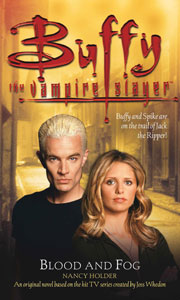Nancy Holder’s “Blood and Fog” (May 2003) starts off with a delicious premise for fans of both “Buffy” and history, as Jack the Ripper enters the Slayer’s sphere. But like the 2002 “Angel” novel “Endangered Species,” co-written by Holder, the last third of the book totally falls apart; it’s filled with copy-editing errors and reads like it was delivered to the publisher minutes before being typeset for the press.
The fear-inducing fog, so evocatively described up to that point, randomly disappears for the final showdown, featuring an endless and boring bevy of interdimensional monsters. Spike’s connection between the 1888 London events and current events amounts to little more than the fact that he is present for both. And Willow delivers an innocent human to Jack in order to save Dawn – a daring development that’s squandered because Holder doesn’t take (or have) time to dig into what it means for Willow.
Still, there’s enough good stuff before the overblown and sloppily written final battle that I recommend “Blood and Fog.” The relationship between Slayer Elizabeth and Watcher Sir James in 1888 London has a juicy premise like a “Tales of the Slayer” entry. She is a rare Slayer who is cowardly – or is she? Elizabeth’s actions, as far as a reader can tell, are brave. She stakes out street corners with prostitutes for weeks on end to nail the vampires in their midst. And she teams up with Spike and Drusilla to bravely take on Jack, who is a demon in this telling. (In a “Tales of the Vampires” entry written a couple years later, he’s a vampire.) I wondered if James was filling Elizabeth’s head with the notion that she is a coward, when she actually is not.
The fear-infusing fog might have something to do with it, too. Fog is a hard thing to make scary, but Holder pulls it off via various characters who become inordinately terrified in it. A late passage featuring Anya blindly bumbling along is a bit much, since the author had already established the fog’s traits; perhaps it’s to give Xander and Anya something to do.
In her early novels such as “The Gatekeeper Trilogy” (co-written by Christopher Golden), Holder was writing essentially alternate-universe “Buffy” stories, so it’s notable that “Blood and Fog” fits tidily between “Tabula Rasa” (6.8) and “Smashed” (6.9). The author wonderfully delves into Buffy’s feelings about how she’s having sex with Spike and feeling completely dirty about it, and into Willow’s struggles with magic addiction that has caused Tara to leave her. And here’s a juicy detail: Both Jack and Willow smell like strawberries when they are tapped into dark magic.
It’s wonderful up until the witch’s skimmed-over actions in the big showdown, that is: Willow nabs a terminal patient from a hospital, someone she knew from school, and gives her to Jack to complete his circle of 12 sacrifices, in exchange for Dawn being spared. Maybe it’s because of the wiggy notion that a sick person’s life has less value, but Holder does not delve further into this action of Willow’s, which should rank up there with her later skinning of Warren among her formative deeds on the path to becoming Dark Willow. But I’m fairly sure it won’t be mentioned in future novels. Then again, I haven’t read the “Wicked Willow” trilogy yet, so maybe I’ll be pleasantly surprised.

There might’ve been an opportunity here to contrast Spike’s 1888 life with his 2001 life; he’s a person who loves deeply, but is being used by Buffy. And there’s something about his relationship with Dru that has always struck me as slightly sad; Spike loves her, and Dru usually seems to adore him, but she’s flighty – how does this color Spike’s feelings, and how does it compare to how Buffy is treating him?
An even more frustrating path-not-taken is the Giles-Olivia relationship. Giles, helping Buffy via research and telephone from England, fears that Olivia will break up with him if he doesn’t minimize his time spent helping Buffy. And at the book’s end, she does. But there are no conversations or tension between the two. Olivia has an odd habit of flitting into “Buffy” stories without ever becoming a fleshed-out character; see also her Season 4 TV appearances and “The Lost Slayer.” (Writers will take one more crack at her in the Season 10 comics.)
When Holder has time to polish her work, it’s among the elite “Buffy” tie-in fiction; when she doesn’t, it can become a mess. I don’t like reading massive battle sequences with monsters pouring through interdimensional portals to begin with, but even with that said, the climax of this book is a slog to get through. It features bunches of “Oh my God!”s from Spike as creatures emerge, Buffy’s pontifications on the hottest “Lord of the Rings” actors and her preference for “Farscape” over “Star Trek” (while she’s blinded and fighting for the fate of the world), and the unnecessary revelation that Tara is wearing thong underwear. (Granted, that latter detail is more interesting than descriptions of monsters.)
I would be stunned to find out that “Blood and Fog” turned out the way Holder wanted it to, because the final act seems like she quickly wrote it, had no time for a second read, and sent it off.
Click here for an index of all of John’s “Buffy” and “Angel” reviews.

